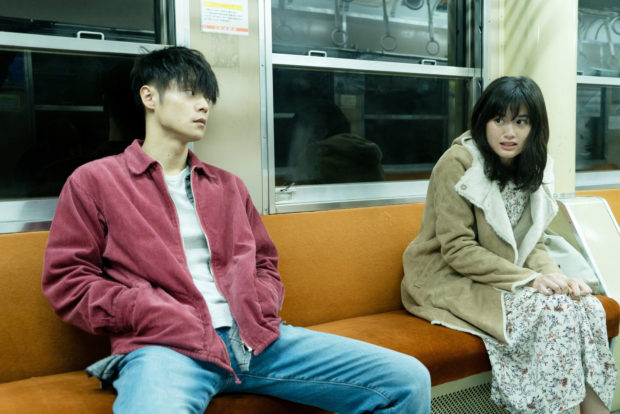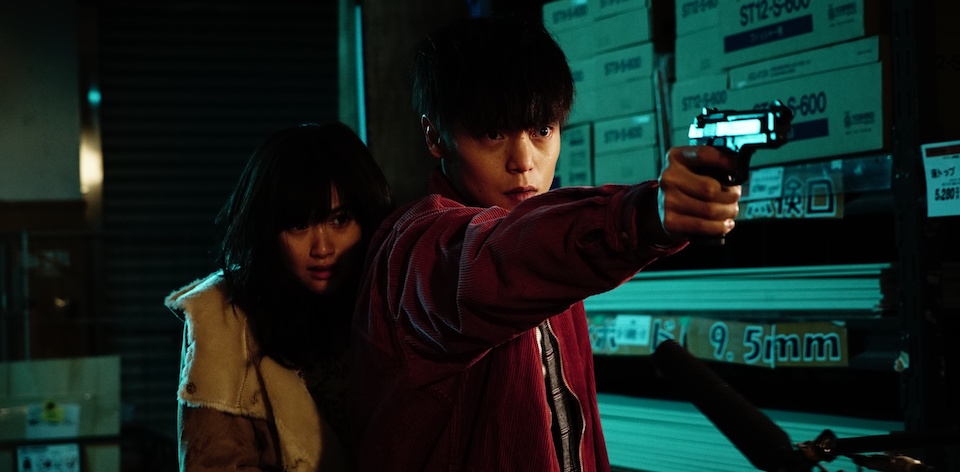Takashi Miike has always been a filmmaker who has erred on the side of quantity, as attested by the fact that this is about his 103rd feature film in the last thirty years. So, it’s pleasing to see that FIRST LOVE (初恋), built on a story by Muneyuki Kii and screenwriter Masaru Nakamura, is arguably his most focused film in years, and strangely becomes more so as it goes along.
Lonely boxer Leo (the multi-talented Masataka Kubota) is told by a doctor that he has a brain tumour. Meanwhile, Monica (Sakurako Konishi) has been forced into prostitution and drug addiction to pay off her father’s debts. When she runs from crooked cop Ōtomo (Nao Ōmori), Leo’s intervention sends them both on a collision course of violence and frenetic action.
Following the alternatively sedate and moody Laplace’s Witch, the aesthetic of FIRST LOVE is a return of the Miike we’ve not seen around these parts since at least For Love’s Sake. Where that film was a musical with random acts of violence (and vice versa), this is two people on the lam with random acts of dance. (A recurring motif of the ghost of Monica’s father, dressed only in his underpants and chaotically dancing, is one of the more Miike indulgences of the picture).

This blisteringly paced bit of yakuza pulp ramps up its insanity for the last 30 minutes, a roller coaster of bloodletting and unexpected animation literally bursting out of walls. Telegraphed early in the film by a disembodied and still blinking head, this is a bit of the old ultraviolence we’ve come to love Miike for. At times these elements are at odds with each other, but it all culminates in a satisfying supermarket slash fest, complete with limb loss that sidles right up to the edge of comedic. (Think: Monty Python and the Holy Grail and the Black Knight).
The whole movie is a live action cartoon, which makes a brief burst of animation – as a car careens through a wall – even more seamless in its explosive entrance. It’s a throwback to Miike’s many manga/anime adaptations over the years, one many have been quick to call ‘Tarantino-esque’ except for one key fact: Miike has been honing this insanity since 1991 and has probably influenced more of this style than aping it.
Fresh off the back of the high-profile Tokyo Ghoul and Gintama film series, Masataka Kubota lends some star appeal to the leading man. He has the unenviable job of anchoring the more outlandish elements that his costars revel in, including newcomer Sakurako Konishi. Yet it’s Shota Sometani, as the increasingly beleaguered yakuza, and the single-named Becky who steal every scene they are in. The latter is a key player in the aforementioned melee, and her joy for killing is a little bit infectious.
Other technical elements, including regular Miike cinematographer Nobuyasu Kita, are all top-notch. While Miike’s film’s can sometimes look more or less like the sum of their parts, there are moments of genuine beauty here. Take a chase sequence of a bridge extending out into the water, as the getaway car is pursued by dozens of cop cars. It’s every bit as impressive as a Hollywood counterpart. Kôji Endô’s score is also appropriately pacey while managing to include random didgeridoo sounds throughout.
FIRST LOVE may not be Miike’s most accomplished film to date, but it’s unquestionably a return to form. Like many of his recent films, and arguably his career to date, he’s never been great at self-editing. Yet there’s fun to be had here in picking through the gleefully chaotic collisions.
2019 | Japan| DIRECTOR: Takashi Miike | WRITERS: Masaru Nakamura, Muneyuki Kii | CAST: Masataka Kubota, Nao Omori, Shota Sometani, Sakurako Konishi, Becky, Takahiro Miura | DISTRIBUTOR: Little Monster Entertainment (AUS) | RUNNING TIME: 108 minutes | RELEASE DATE: 20 March 2020 (AUS)






